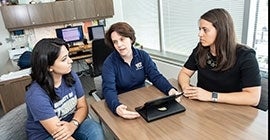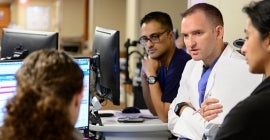- About
- Admissions
- Programs
- Students
- Faculty
- Research
- Institutional Research Training Grants
- Office of Research and Scholarship
- Nursing Research and Scholarship HUBS
- HUB for Excellence in Digital Health Research
- Genomics of Patient Outcomes HUB
- Sleep and Circadian Science Research Hub
- Nursing Health Services and Policy Research HUB
- Cancer Survivorship HUB
- Maternal/Perinatal and Reproductive Health Research Hub
- Aging and Gerontological Nursing Research HUB
- Nursing Education and Clinical Research for EBP HUB
- Active Grants
- Undergraduate Research
- Continuing Ed
- Alumni
- News
- Events
Bachelor of Science in Nursing

The purpose of the baccalaureate program is to prepare a professional nurse whose practice is based upon nursing science, related sciences and the arts in order to promote, restore, and maintain the health of human beings. Graduates of the program are generalists with the necessary base for graduate education and continuing professional development.
About our Undergraduate BSN Program
Education for the practice of professional nursing demands a substantial knowledge of nursing, using the behavioral and biological sciences as a theoretical base. Learn more about the BSN program.
BSN Application & Admission
High school graduates are directly admitted to the four-year, full-time pre-licensure baccalaureate nursing program. Students enrolled in other schools within University of Pittsburgh may apply for an internal transfer to the first year. Learn more about applying and admission.

BSN Student Learning Outcomes
View student learning outcomes of the Bachelor of Science in Nursing (BSN) program.

Curriculum
View the recommended BSN Curriculum plan of study.

Minor
The School of Nursing does not offer minors for the BSN program. However, students are encouraged to consider earning minors offered through the Dietrich School of Arts and Sciences or other schools within the University of Pittsburgh. View some of the minors completed by students in the School of Nursing.

Additional Information

Regional Campuses
In addition to the Pittsburgh campus, the BSN program is offered at two of Pitt's regional campuses. All three campuses follow the same curriculum. More information about the regional campuses can be found at:
- Nursing at the University of Pittsburgh, Johnstown
- Nursing at the University of Pittsburgh, Greensburg
Professional Licensure Notification
Graduation from our accredited program is your initial step toward obtaining a professional RN license and practicing as a registered nurse. The U.S. and its territories usually require a professional license to be employed. For state specific license requirements, please visit NursingLicensure.org.
Students graduating from Pitt School of Nursing have taken the National Council Licensure Exam (NCLEX-RN) for these states:
California, Colorado, Connecticut, DC, Delaware, Florida, Georgia, Hawaii, Iowa, Idaho, Illinois, Indiana, Kentucky, Louisiana, Massachusetts, Maryland, Maine, Minnesota, North Carolina, New Jersey, New York, Ohio, Oregon, Rhode Island, South Carolina, Tennessee, Texas, Utah, Virginia, Washington, Wisconsin, and West Virginia.


